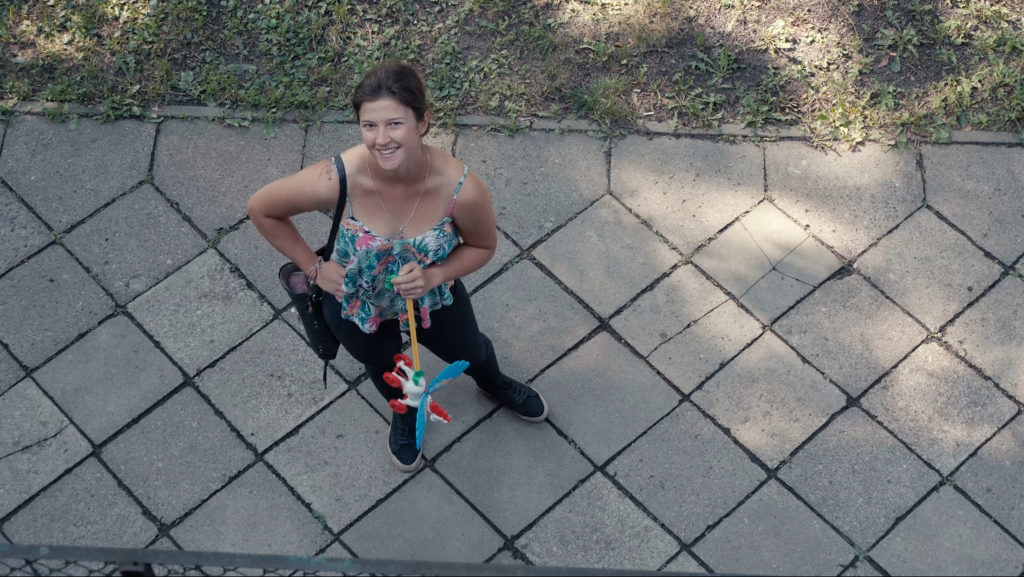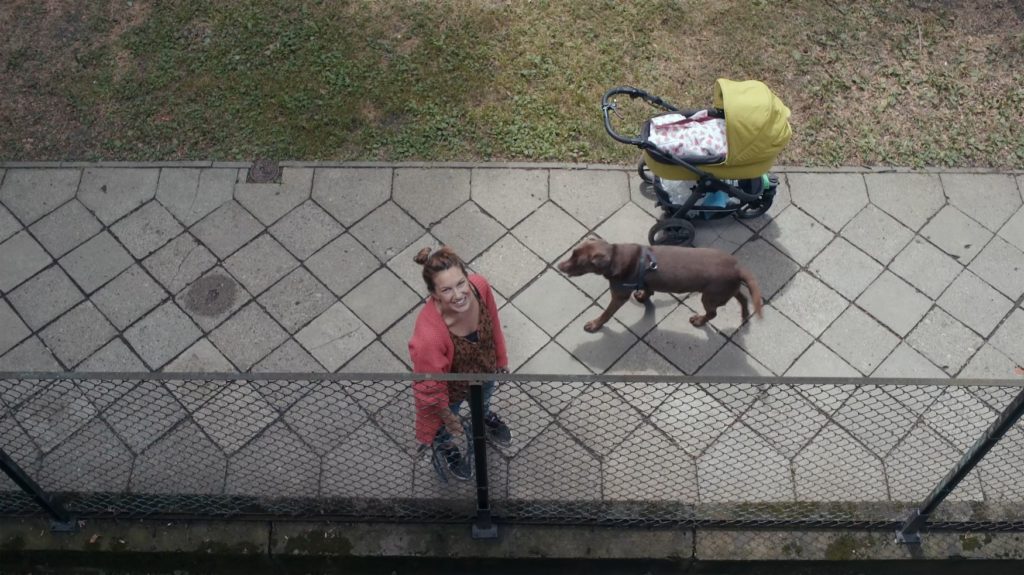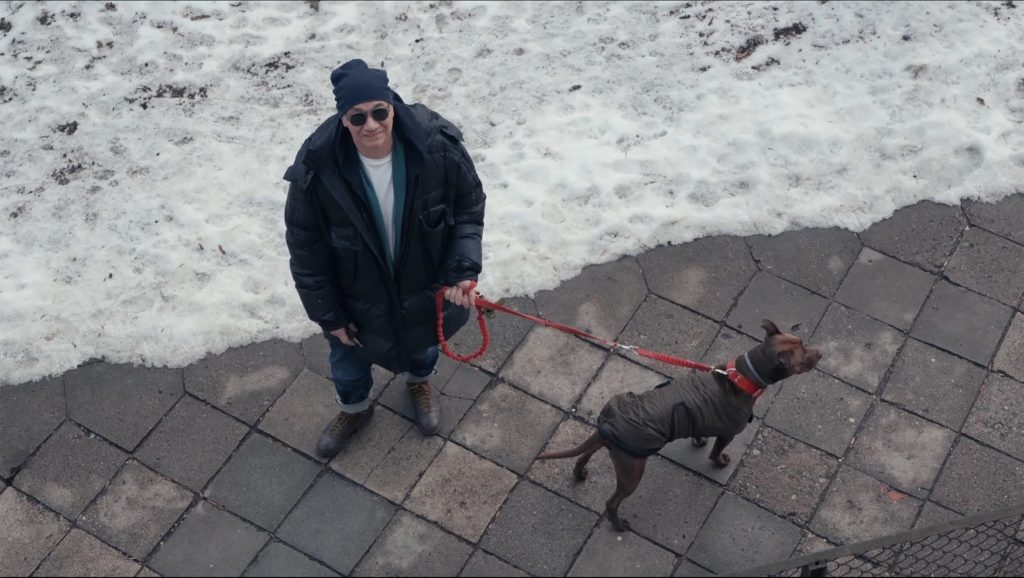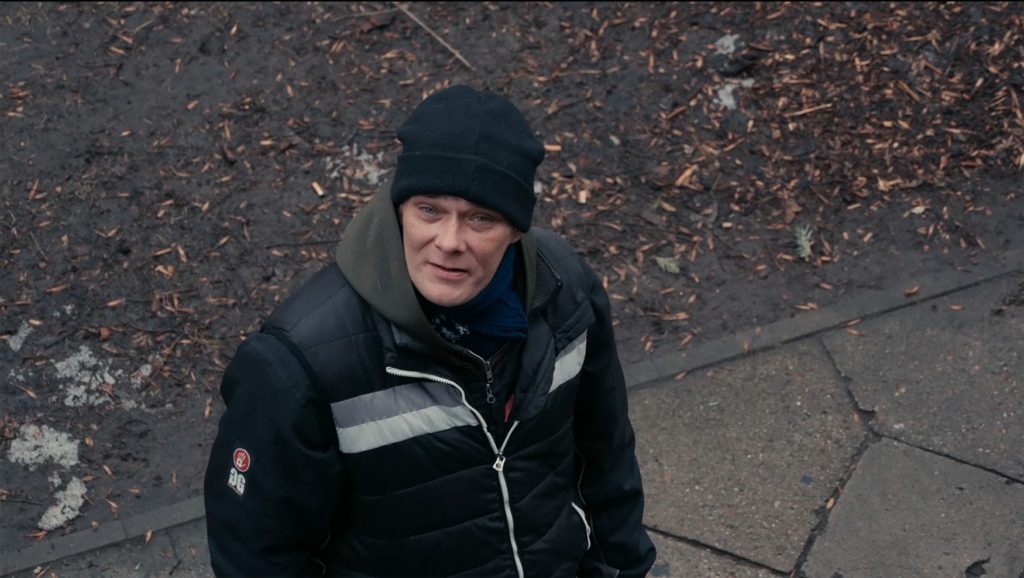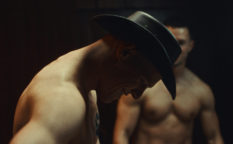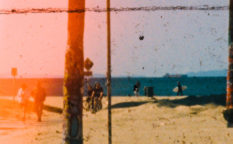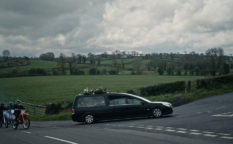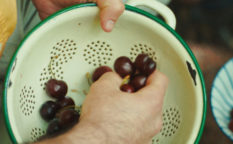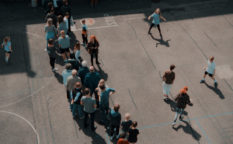Pawel Lozinski: “The Balcony Movie’ was a kind of casting/ soul-searching process.”
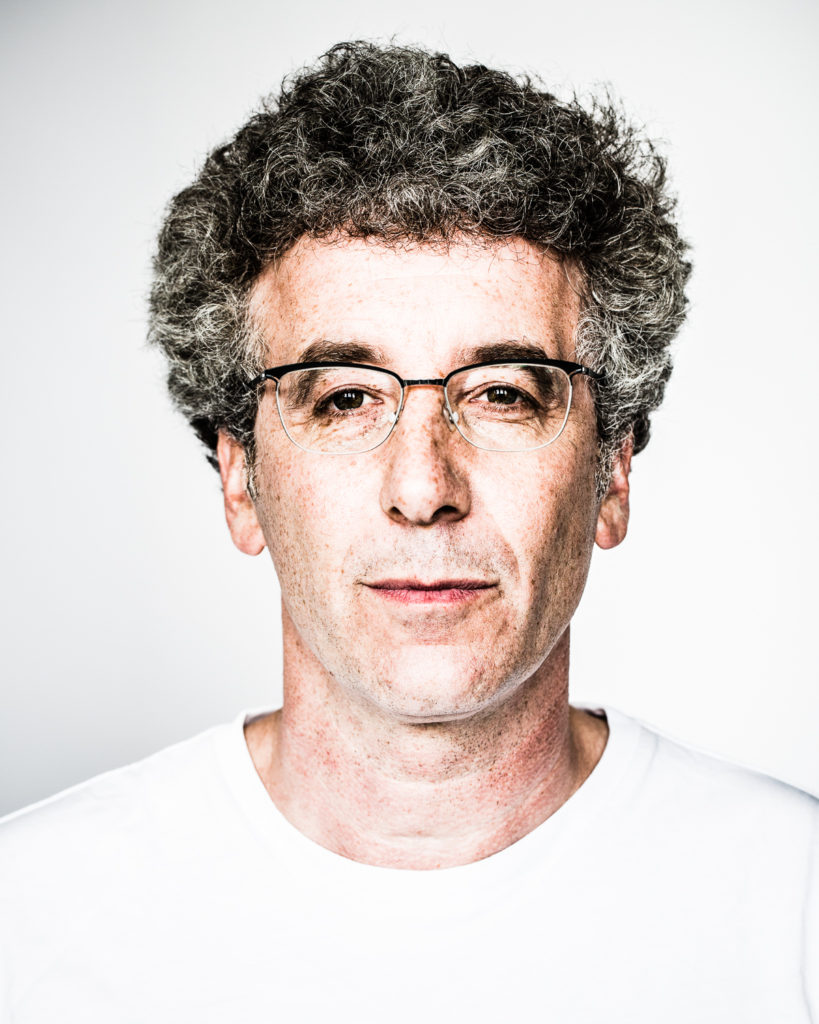
Pawel Lozinski appologizes for being slightly late. He’s out of breath, explaining that the traffic in Warsaw is impossible at the moment, and that the city almost feels like being in the state of war. “We have approximately 200000 refugees in the capital only, and about 2 million in the country. Let me put it like this – it’s an awful story“, he adds, visibly shaken. “I think that we were simply naive or stupid, because everything was just pointing out at the war for a long time. Putin had a 150000 thousand border troups in the Ukraine, what for? Just to scare us?” I can not disagree with his words, responding that me, too, am afraid that the situation will escalate further. “Us too, in Poland”, he responds. “It’s awful to look at all refugees coming from the Ukraine – you see women with children and pets, but without husbands. They carry everything they love with them.”
We can’t shake off the topic for a while. After all, the agression on Ukraine is something that occupies everyone’s mind at the moment. But we know that our concentration should be elsewhere – this zoom conversation, with its time limitation should be about his documentary The Balcony Movie, on the ocasion of its New York premiere within the frames of Museum of the Moving Image.
Ever since its world premiere in Locarno (Semaine de la Critique) last year, The Balcony Movie has been on the move, screening at the major film festivals. It’s next, and certainly not the last stop is in the Highlights section of CPH:DOX.
This, of course, is the excellent reason to have an extensive talk about the film which, just like Lozinski’s previous documentaries, cast a curious eye at his immediate environment, this time – his Warsaw-based neighbourhood.
Pawel Lozinski has spent two years on his balcony, filming his conversations with passers-by curious to know who they were, and if they wanted to say anything about themselves.
Before we start the proper talk about “The Balcony Movie”, can you please introduce yourself in a way that you want to be presented in a published interview?
I am a human being, I am a man, a husband and a father. Or maybe father in the first place, and then husband, man and human being. Last but not least, I am a filmmaker. I studied in the Lodz film school which was 30 years ago. My first film was ‘Birth Place’, a story about one Polish Jew who came from America to Poland to find out what happeend to his father. And, I’ve been making documentaries ever since. I also made one fiction film. I was the assistant of Krzysztof Kieslowski on ‘Three Colours White‘ as well. That was an interesting experience. But speaking of documentaries, I prefer reality to my imagination. Why invent anything when the reality was already created by somebody. It’s like with The Balcony Movie – I could never possibly invent such kind of stories.
You were standing on the balcony with the camera positioned in a very challening angle. Why were you interested in the passers-by? I can’t shake off the feeling that you were creating a kind of time capsule.
Yes, you are right. It’s a time capsule. At the same time, the simplest answer would be my curiosity about who the passers-by are, what they have in their heads, hearts and souls. The main idea was to change the rules of the game.
Normally, when I am shooting a documentary it’s all about chasing after someone with my camera and trying to look for the right protagonists. Sometimes this is happening in Warsaw, often somewhere else in Poland, and sometimes even abroad. But this time I wanted to change the rules of the game. It was kind of experiment to see what would happen if I had the camera in one fixed place and see if it’s true that the whole world would come into my frame, and if it’s enough just to wait. So I started that experiment.
I was always curious looking from the balcony when I was not armed with my camera, and just percieving with my ears and eyes who the passers-by were. It is not that easy to ask questions behind the camera and start the conversation with a “hi, how are you?”.
When you move the camera, it kind of becomes justified because you are making a film. So, just to prove that my concept was right, I’ve stopped, waited and listened. It is true what I am saying to my protagonists in the film that I did not have an idea for a new film, and that I was looking for right people. ‘The Balcony Movie’ was a kind of casting/ soul-searching process.
It seems that you are searching for the ultimate answers to your own questions about the identity and about the essence of life.
Yes, of course. Sometimes when I don’t have answers to the pressing questions that occupy my mind, the camera helps me to find them. For example, I made a film called ‘Chemo‘ (2009) about the chemotherapy because my mother had cancer, and I didn’t know how to talk to her about it. She was, let’s put it that way, not very open. She didn’t want to address the subject. She was suffering, but I didn’t know how to speak to her, so I was with her in the Warsaw cancer hospital several times. I was observing other people who were ill, and I took my camera to search for the answer to my personal question how to deal with that desease and the suffering of someone close to me, and whom I love very much.
How long did it take you to gather the material for ‘The Balcony Movie’, and when did you know that you had what you wanted to have?
This is one of the most difficult questions. It took me two and a half years to shoot it. The pandemic helped me to stop, because after two years the virus came and people started wearing masks. I was completely conscious that the pandemic won’t be a part of the film because I really wanted to have a kind of happy end, and not to make people fear. At the beginning I was thinking that one year of shooting should be enough, but then I got so hungry for other stories that I couldn’t stop. I was never satisfied. At the same time, for a documentary filmmaker, when you can take your camera and go to work almost every day is great, particularly because it doesn’t happen very often. I am sitting at this place which is balcony (showing his apartment) and I am the director outside, and the private person inside of the flat. Just a wall, or a window, separates the two. It was so great to have that kind of work every day. I started to be a bit addicted. It wasn’t only addiction to filmmaking, but to having the constant contact to people. I came in touch to some 30 characters a day, and I was tempted by it, but I was suffering like a proper addict as well. That’s when I knew that I have to stop the experiment.
I guess that the neighburhood must have reacted to you in a certain way. Were they maybe thinking: “That guy is still there. When will he stop?”
Yes, but at the same time this person was their neighbour. So I was not somebody completely unknown to them. I became a part of furniture, an element of scenography. I created a kind of secular confession. After a couple of months everyone knew that they can approach that spot below my balcony to talk to me, because I was – let’s say – always there.
What were the most surprising moments during the shooting process?
It wasn’t any particular moment but the realization that there wasn’t any agression towards me. Especially surprising for Poland. I was very surprised that nobody tried to attack me. I even dreamt about being in conflict situations that never happened. That could have been a really good material, but I didn’t have any such moments (laughs). I tried to be very nice, polite and open to the people because when you want to have real protagonists, you need to give them something in return: a smile, deep understanding, a carefully picked-up question, and your time.
What I observed was that people just wanted to be listened to, and not being completely unknown characters from the street.
This means that you probably tied closer connections with some of the protagonists through this film.
Yes, I have a very close contact to some of them. For instance, with the janitor of our building, also with one of my elderly neighbours, and sometimes I also meet the former jail-bird because he is still working close to my place. There is a big street called ‘Francuska’ (French) which is where he is looking for the money. While I was signing the agreement contract with him, he told me that he was taken back by his family. He lives with his wife and adult children, and they even have a dog. He is very proud of the fact that he’s got a roof over his head after such a long time.
I guess that most of the people appearing in the documentary had the chance of seeing it at the Polish premiere back in September. What were their reactions?
Starting with April, the film will be screened in the cinemas which is when I think that most will finally see it. So far, I didn’t have much feedback. But you must realize that I encountered almost 2000 people during the shooting, but I put only 80 of them in the film. I guess that many will go to the cinema expecting to see themselves in it, and some will be dissapointed.
The film was born out of my curiosity about them, and now their curiosity will take them to the cinema. That guarantees me 2000 spactators from the start (laughs).
Knowing how long the shooting was taking place and how many people were recorded with your camera, you must have had an incredibly long material to edit. This must have been the most difficult process?
I had more than 20 terabytes of material. It wasn’t easy to edit it, but I luckily had talented, young co-editors who run a small, two people company. It took us almost a year to edit. We preserved the randomness of those encounters and the feeling which I had during the shooting, because I was so curious about who the next person was going to be. We tried to transmit that excitement to the viewers.
You always chose very personal stories, concentrating on people from your immediate environment.
I think it’s natural and I believe that one can not make documentaries without a strong dose of curiosity. In my case, curiosity came first and the filmmaking followed.
How much time did you spend on that balcony during the day?
That strongly depended on many factors such as the weather, my mood or my family which always comes first. Sometimes I would sit there for only two hours, on other days I would spend the whole night outside. During the week, there are many neighbours on the street unlike on weekends when there would be other people coming over to visit their relatives or friends – tourists, so to speak. I didn’t follow any strict rules, but I had to work on myself not to stand there for a very long time because I was very tempted to do exactly that. It was difficult when I finished shooting. I felt very depressed, although I knew that it had to come to an end.
How did you record the sound?
Mostly over boom, with a very long microphone, supported by two wireless microphones which were put on the fence. They are even visible in the take showing me putting them on. It wasn’t easy of course, because there is a busy street close by and sometimes other sounds coming from the apartments disturb the recordings: drilling, people refurbishing their flats, and such. The microphone is a very stupid tool. It’s not like a human ear that can take in only the sounds it wants to hear. It doesn’t think, so it’s mixing all sounds together. We had to reduce the noises in the post-production. That was technically speaking the most difficult thing during the shooting. Handling the camera was quite easy. What I want to add is that I have a feeling that people were not just talking to me, but also to someone above, confessing.
Because you are so eager to establish contacts with people, you are probably already plotting a new film.
I am thinking about making a film about the Ukrainian refugees, but it is not that easy because they are very fragile and scared, and I don’t want to push them to tell me their stories. It is too fresh, too new for them. I spoke to some psychotherapists who begged me not to touch that subject with them because they are traumatized. So, I will wait, but I will make that film one day.
The film could also be about the meeting between Polish people and Ukrainian refugees. About us and them. I am so happy that the Polish society is so open towards the refugees. I really didn’t expect such a strong movement. There are hundreds of NGOs who started to take care of the refugees, to feed them and provide shelter. One of the most important initiatives was to open schools for the refugee children. It’s like a national movement right now. The government is doing absolutely nothing, but it’s the people who are organizing everything. I can not remember a similar situation since the Solidarity movement in the 1980s against communism.
What is difficult for me right now is that on one hand, we are helping thousands of Ukrainian refugees, but at the same time there are other refugees coming from Iraq, Kazakhstan and Afghanistan over the White Russian border and our government is pushing them back. Because they are of other religion, other colour of skin. There lots of NGO people working at the border, and they are treated very badly by the police and military. It’s a kind of schizophrenia helping one kind of people and chasing away the others. Of course it’s racism. Nobody wants to take a Roma or Kazakh family in their house. Almost nobody because there are always exceptions from the rule. It’s easier to help a Ukrainian family because the language is almost the same, and the situation is similar -the shared experience and Christian religion.
All film stills from ‘The Balcony Movie’. ©Pawel Lozinski

